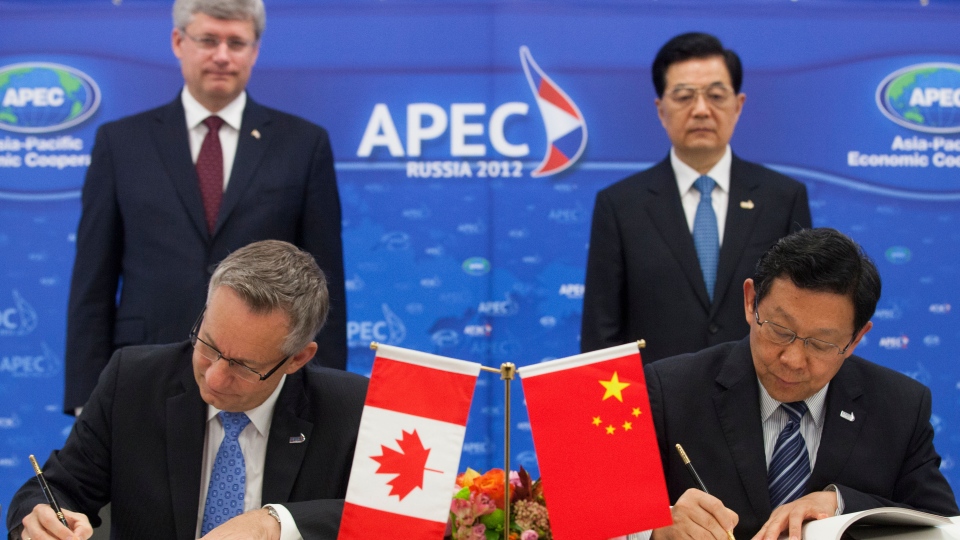Canada liable to compensate Chinese companies for COVID-19 losses under FIPPA

Canada is liable to compensate Chinese companies for losses incurred due to the coronavirus disease (COVID-19) pandemic, under the terms of a trade agreement the Harper government signed with China.
Former Prime Minister Stephen Harper’s Conservative government signed the Agreement Between the Government of Canada and the Government of the People’s Republic of China for the Promotion and Reciprocal Protection of Investments[1], commonly known as FIPA, with China on September 9, 2012 without even releasing the full text to the public.
The Harper government ratified the agreement two year later in October 2014 despite warnings from experts and labour, human rights and environmental advocates that the agreement was detrimental to Canada’s interests.
“Article 11 of the FIPA states that if Chinese firms in Canada suffer losses due to ‘war, state of national emergency, insurrection, riot or other similar events,’ they can sue the Canadian government for compensations,” explains Mukesh Khanal of University of Calgary’s The School of Public Policy. “War and insurrection are well-understood concepts. War is an armed combat or conflict within a country or between different countries. An insurrection is a violent rebellion by the people against their own government. However, a riot or a national emergency needs to be defined clearly.”

However, Canadian firms may not be able to sue China for compensation easily.
“The FIPA is clear that Canadian firms in China cannot approach Chinese courts for dispute settlement,” Khanal explains. “Annex C.21 of the FIPA suggests that Canadian firms in China have to first ‘make use of the domestic administrative reconsideration procedure.’ If they are not satisfied with the resolutions from that procedure, they can submit claims to arbitration. The FIPA does not mention if Canadian firms in China can register a case in the Chinese courts. That is a disadvantage to the Canadian firms in China because there is no guarantee that the reconsideration procedure will be unbiased because it is not a judicial body.”
And Chinese companies can sue the Canadian government in court, or in secretive tribunals, but the same privilege is not extended to Canadian firms who seek to sue China.
“Chinese firms in Canada are not forced to first approach one particular mechanism before
approaching another,” explains Khanal. “They are free to approach either a Canadian court or a FIPA tribunal.”
approaching another,” explains Khanal. “They are free to approach either a Canadian court or a FIPA tribunal.”
“On the other hand, Canadian firms in China should first approach the administrative reconsideration procedure, a bureaucratic set-up created by the Chinese government, for
dispute settlement,” adds Khanal. “If unsatisfied with the procedure’s decision, the firms can approach a FIPA tribunal. They are not allowed to approach a tribunal directly in the first place, which is a luxury Chinese firms in Canada have. This presents the Chinese firms in Canada with a clear advantage over Canadian firms in China.”
dispute settlement,” adds Khanal. “If unsatisfied with the procedure’s decision, the firms can approach a FIPA tribunal. They are not allowed to approach a tribunal directly in the first place, which is a luxury Chinese firms in Canada have. This presents the Chinese firms in Canada with a clear advantage over Canadian firms in China.”
Chinese foreign direct investments to Canada stood at $17 billion at the end of 2018 according to Statistics Canada[2].
The Conservatives defended their decision to go ahead with the deal saying Canadian jobs depended on it.
“China is the second-largest economy in the world,” Former Parliamentary Secretary to the Minister of International Trade and current party leadership candidate Erin O’Toole told parliament when questioned about FIPA ratification. “Canadian exporters are selling to and dealing with that country on a daily basis, and the jobs created from that account for one in five jobs in Canada.”
“Canadian exporters have been asking for protection,” added O’Toole. “The P in FIPA stands for ‘protection’. This will give these companies certainty in their contractual dealings in China.”
The COVID-19 pandemic, which began in Wuhan, China, has infected over 2.3 million people worldwide and claimed more than 160,000 lives.
No comments:
Post a Comment
Comments always welcome!